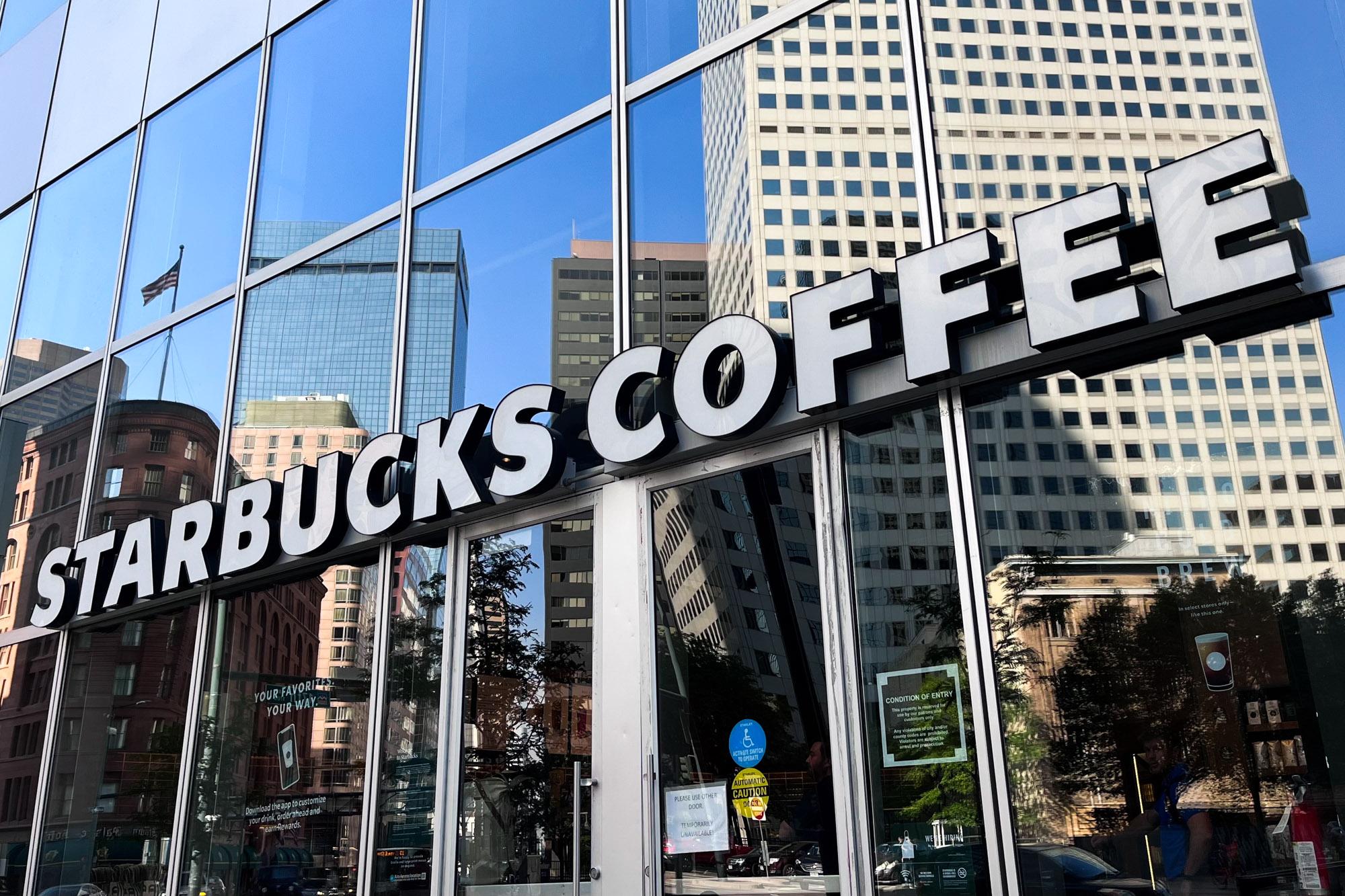
Starbucks broke the law when it discouraged union support at four of its stores in Colorado, a federal prosecutor said during opening arguments in the coffee company’s latest labor rights trial on Tuesday.
Store managers dissuaded workers from voting in favor of unionization during all-staff meetings, and punished pro-union baristas through write-ups and wrongful terminations, said Isabel Saveland, a National Labor Relations Board attorney representing workers from Denver and Colorado Springs. The agency is hoping to win the re-hiring of three union workers, as well as secure back pay and damages for other staffers it says the company unfairly targeted.
“Starbucks’ unlawful tactics go against unionization and our country’s laws,” said Saveland during her opening arguments in federal court in Denver.
The case is the largest legal action workers have taken against the company’s alleged union busting in the wake of a wave of organizing at Starbucks locations in the state last year. Last month, a federal judge ruled in favor of workers at another union store in Denver.
More than 270 of the coffee giant’s locations across the United States have unionized since December 2021. The first Colorado location, in Superior, joined Starbucks Workers United last April, followed by locations in Denver, Colorado Springs and Greeley.
The latest trial involves charges from two stores from Denver: 16th Avenue and Tremont Pl. and Leetsdale Dr., as well as two stores in Colorado Springs: Academy Blvd. and Flintridge Dr. and Brookside St. and Nevada Ave., which the company has since shuttered.
Attorneys representing Starbucks called the latest set of allegations overblown and defended the company’s actions.
“What we’re looking at is a bunch of green employees who don’t like playing by the rules,” said Kevin Kraham, an attorney with Littler Mendelson, during opening remarks. “The real world has consequences and people are held accountable.”
The case includes six unfair labor practice charges in total, along with three wrongful termination complaints. An administrative law judge combined the proceedings into one trial earlier this year due to their similarities.
In the wrongful firing charges, the NLRB claims Starbucks let union workers go for minor policy violations. In one case, a worker at the company’s 16th and Tremont store accidentally left $40 in a lockbox unsecured overnight.
On his final warning, a manager included a past tardy he had never been written up for.
“The employee was upset and told his managers it was all about retaliation for his union support,” said Saveland. “The store said no, it wasn’t.”
In another case, a Colorado Springs shift supervisor was fired for cursing at a teenage subordinate. Another employee at the Leetsdale Starbucks was fired after touching a cake pop by hand and serving it to a customer after it briefly dropped onto a sanitized counter.
Managers coached the employee on what to say in a written statement about the incident and then later used it against her during her termination, Saveland said.
Starbucks attorneys said the firings were justified.
“A five-second rule doesn’t apply at Starbucks,” Kraham said. “Just because employees support unionization doesn’t mean that they get to break the rules.”
The company’s attorneys pushed back against allegations of unfair labor practices.
Workers allege the company unfairly enforced workplace policies against union supporters, which would be a violation of federal law.
In one case, a union supporter was told to remove a Starbucks Workers United shirt they wore to work. Managers also took down a union brochure that workers posted on a break room bulletin board.
“It’s not a billboard for anybody to come in and put up what they wish,” Kraham said. “And in all of these incidents workers were not held accountable in the slightest.”
The trial is expected to last through the rest of this week and include testimony from workers and store managers involved in some of the incidents. On Tuesday, the NLRB presented its first witness, Bradley Kurtz, a barista at the Starbucks on Academy and Flintridge in Colorado Springs.
Saveland played a 90-minute recording that Kurtz took during a captive audience meeting the store manager held ahead of the store’s union election. In it, managers are heard discussing the changes that come along with forming a union.
Managers in the tape said electing a union would potentially have a negative impact on employee benefits.
Shortly before the captive audience meeting, Kurtz, a union organizer, had explained to a store manager that workers would be organizing and asked if the manager wanted to take part in a press conference he was planning to announce the vote.
“I wanted this to be a bipartisan effort,” Kurtz testified.
“What did he say?” Saveland asked.
“He had some phone calls he needed to make,” Kurtz said. “And then I think he gave me a hug.”
This week’s trial comes as many Starbucks Workers United stores in Colorado struggle to get their first contracts from the company. Both the union and company have traded blame for delays.
Last year, workers went on strike to protest the stalls and shut down at least three Colorado Starbucks locations. The union has said it plans to take similar actions again if negotiations don’t move forward.
SBWU have called the delays an “unprecedented union-busting campaign” and have promised to fight the actions in future court battles.
“Starbucks is currently being prosecuted for over 1,400 violations of federal labor law and has been found guilty of violating laws across the country,” the union said in a statement about this week’s trial in Denver. “This hearing is yet another example of workers and the National Labor Relations Board holding Starbucks accountable for their actions.”









